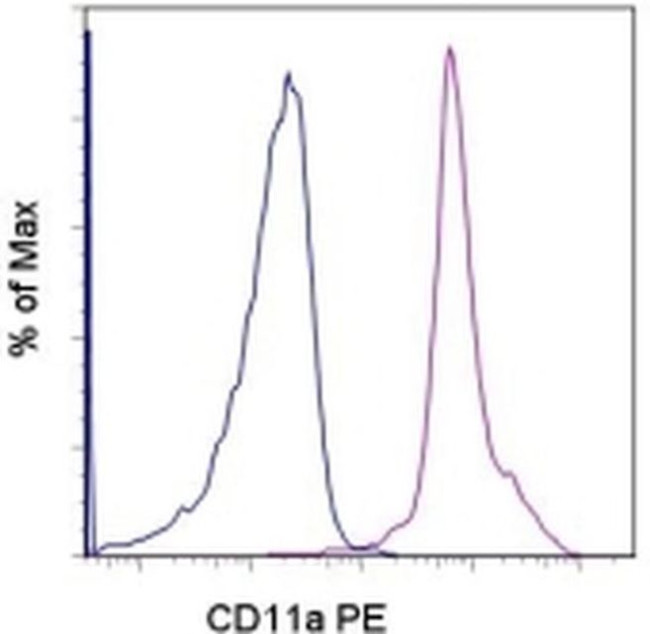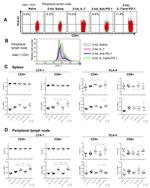Invitrogen
CD11a (LFA-1alpha) Monoclonal Antibody (M17/4), PE, eBioscience™
Product Details
12-0111-82
Species Reactivity
Published species
Host/Isotype
Recommended Isotype Control
Class
Type
Clone
Conjugate
Excitation/Emission Max
Form
Concentration
Purification
Storage buffer
Contains
Storage conditions
Shipping conditions
RRID
Product Specific Information
Description: The M17/4 monoclonal antibody reacts with mouse CD11a, the 180 kDa integrin alpha L, also known as the lymphocyte function associated antigen-1 (LFA-1) alpha chain. LFA-1, formed by non-covalent association of CD11a with CD18 (integrin beta 2), serves as an important adhesion molecule involved in lymphocyte and granulocyte function. CD54 (ICAM-1), CD102 (ICAM-2), and CD50 (ICAM-3) are ligands for LFA-1. CD11a is expressed by all leukocytes.
Applications Reported: The M17/4 antibody has been reported for use in flow cytometric analysis.
Applications Tested: The M17/4 antibody has been tested by flow cytometric analysis of mouse splenocytes. This can be used at less than or equal to 0.5 µg per test. A test is defined as the amount (µg) of antibody that will stain a cell sample in a final volume of 100 µL. Cell number should be determined empirically but can range from 10^5 to 10^8 cells/test. It is recommended that the antibody be carefully titrated for optimal performance in the assay of interest.
Excitation: 488-561 nm; Emission: 578 nm; Laser: Blue Laser, Green Laser, Yellow-Green Laser.
Filtration: 0.2 µm post-manufacturing filtered.
Target Information
CD11a (LFA-1 alpha, ITGAL) together with CD18 constitute leukocyte function-associated antigen 1 (LFA-1), the alphaLbeta2 integrin. CD11a is implicated in activation of LFA-1 complex. CD11a plays a central role in leukocyte intercellular adhesion through interactions with its ligands, ICAMs 1-3 (intercellular adhesion molecules 1 through 3), and also functions in lymphocyte costimulatory signaling. CD11a is expressed on the plasma membrane of leukocytes in a low-affinity conformation. Cell stimulation by chemokines or other signals leads to induction the high-affinity conformation, which supports tight binding of CD11a to its ligands, the intercellular adhesion molecules ICAM-1, -2, -3. CD11a is thus involved in interaction of various immune cells and in their tissue-specific settlement, but participates also in control of cell differentiation and proliferation and of T-cell effector functions. Blocking of CD11a function by specific antibodies or small molecules has become an important therapeutic approach in treatment of multiple inflammatory diseases. For example, humanized anti- CD11a antibody Efalizumab (Raptiva) is being used to interfere with T cell migration to sites of inflammation, binding of cholesterol-lowering drug simvastatin to CD11a allosteric site leads to immunomodulation and increase in lymphocytic cholinergic activity. Two transcript variants encoding different isoforms of CD11a have been found. Diseases associated with CD11a dysfunction include benign cephalic histiocytosis and leukocyte adhesion deficiency.
For Research Use Only. Not for use in diagnostic procedures. Not for resale without express authorization.
How to use the Panel Builder
Watch the video to learn how to use the Invitrogen Flow Cytometry Panel Builder to build your next flow cytometry panel in 5 easy steps.
Bioinformatics
Protein Aliases: alpha L integrin; antigen CD11A p180; CD11 antigen-like family member A; CD11a; Integrin alpha-L; integrin alphaL; Leukocyte adhesion glycoprotein LFA-1 alpha chain; Leukocyte function-associated molecule 1 alpha chain; LFA-1A; Ly-15; Lymphocyte antigen 15; lymphocyte function associated antigen 1, alpha polypeptide
Gene Aliases: (p180); Cd11a; Itgal; LFA-1; LFA-1A; Ly-15; Ly-21
UniProt ID: (Mouse) P24063
Entrez Gene ID: (Mouse) 16408

Performance Guarantee
If an Invitrogen™ antibody doesn't perform as described on our website or datasheet,we'll replace the product at no cost to you, or provide you with a credit for a future purchase.*
Learn more
We're here to help
Get expert recommendations for common problems or connect directly with an on staff expert for technical assistance related to applications, equipment and general product use.
Contact tech support




